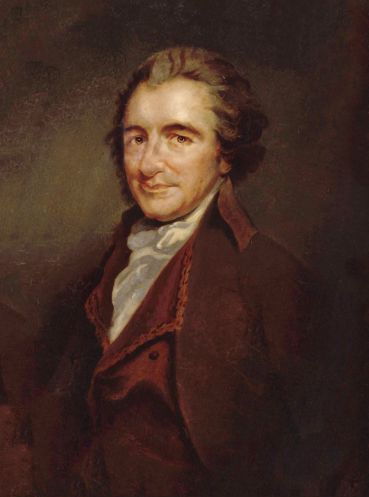Paine, Thomas
Born Jan. 29, 1737, in Thetford, England; died June 8, 1809, in New York (USA). Public and political figure in the USA and Great Britain. A member of the revolutionary wing of the 18th-century Enlightenment.
In 1774, Paine left England for North America, carrying a letter of introduction from B. Franklin. He soon emerged in the forefront of the proponents of independence for the British colonies. In the pamphlet Common Sense (1776), Paine,taking as his point of departure rationalist theories of natural law and the social contract, advocated the idea of the sovereignty of the people and the right to revolution. He demonstrated that it was necessary for the North American colonies to break away from Great Britain and form an independent republic. The ideas expressed in Common Sense were reflected in the Declaration of Independence (1776). Paine, like Jefferson, favored the abolition of slavery.
During the War of Independence in North America (1775–83), Paine wrote a series of 13 pamphlets under the title The American Crisis (1776–83). From 1777 to 1779 he was secretary of the congressional Committee for Foreign Affairs,and in 1781 he took part in the Paris negotiations with the French government concerning aid for the North American colonies.
Paine was an ardent supporter of the French Revolution, which broke out while he was in Great Britain. In the treatise The Rights of Man (1791–92) he developed the ideas of popular sovereignty and republicanism and defended the revolutionary principles of the French Declaration of the Rights of Man and of the Citizen. Paine’s book was banned in Great Britain, and he was forced to emigrate to France, where he was elected a member of the Convention. However, he broke with the Jacobins on the question of the execution of Louis XVI, and in late 1793 he was put in prison, where he spent about a year. As a result of his experience in France, his social views developed, particularly his criticism of bourgeois property relations from a petit bourgeois standpoint. In Agrarian Justice (1797), he condemned the system of property distribution and speculated that labor is the source of capitalist profit. He developed a Utopian plan for state support of the poor through taxation of the propertied classes and through the nationalization of land under a redemption system.
Paine was among those who introduced atheistic traditions into America. In the Age of Reason (1794) the force of reason is decisively pitted against religious delusions. As a philosopher, Paine is perhaps best described as an inconsistent metaphysical materialist.
In 1802, Paine returned to the USA, where, persecuted by reactionary political and religious circles, he died in poverty. The views of Paine—the most consistent spokesman of the radical democratic tendency in the American sociopolitical movement of the late 18th century—directly influenced the shaping of the ideology of the Chartist movement in Great Britain.
WORKS
The Complete Writings, vols. 1–2. New York [1945].
In Russian translation:
Izbr. soch. Moscow, 1959.
REFERENCES
Marx, K., and F. Engels. Soch., 2nd ed., vol. 2, pp. 598–99; vol. 10, p. 365.
Aptheker, H. Istoriia amerikanskogo naroda [vol. 2]: Amerikanskaia revoliutsiia 1763–1783. Moscow, 1962.
Gromakov, B. S. Politicheskie i pravovye vzgliady Peina. Moscow, 1960.
Gol’dberg, N. M. Tomas Pein. Moscow, 1969.
Parrington, V. L. Osnovnye techeniia amerikanskoi mysli, vol. 1. Moscow, 1962.
Conway, M. D. The Life of Thomas Paine, vols. 1–2. New York-London, 1892.
Aldridge, A. O. Man of Reason: The Life of Thomas Paine. Philadelphia, 1959.
I. P. DEMENT’EV

